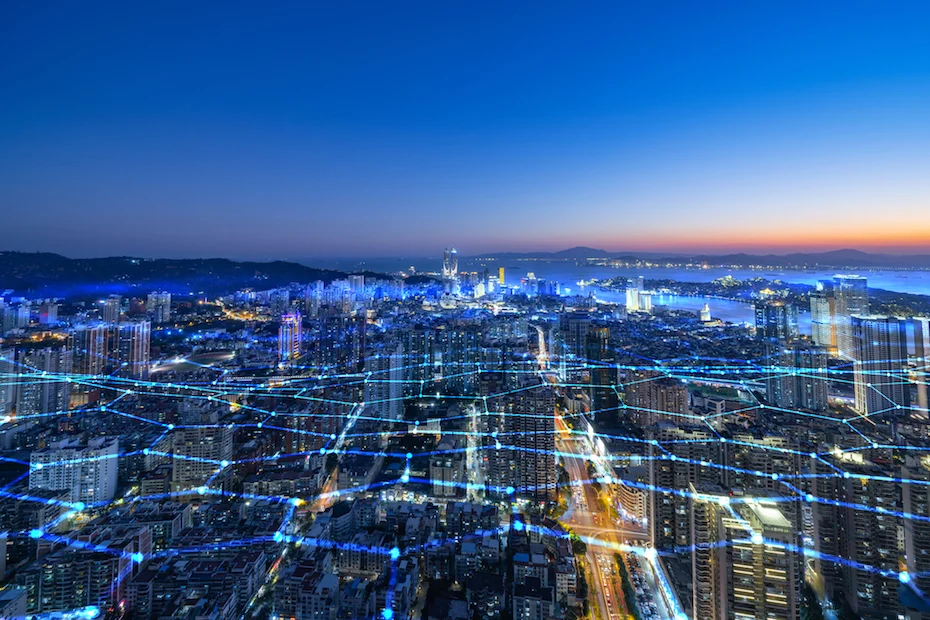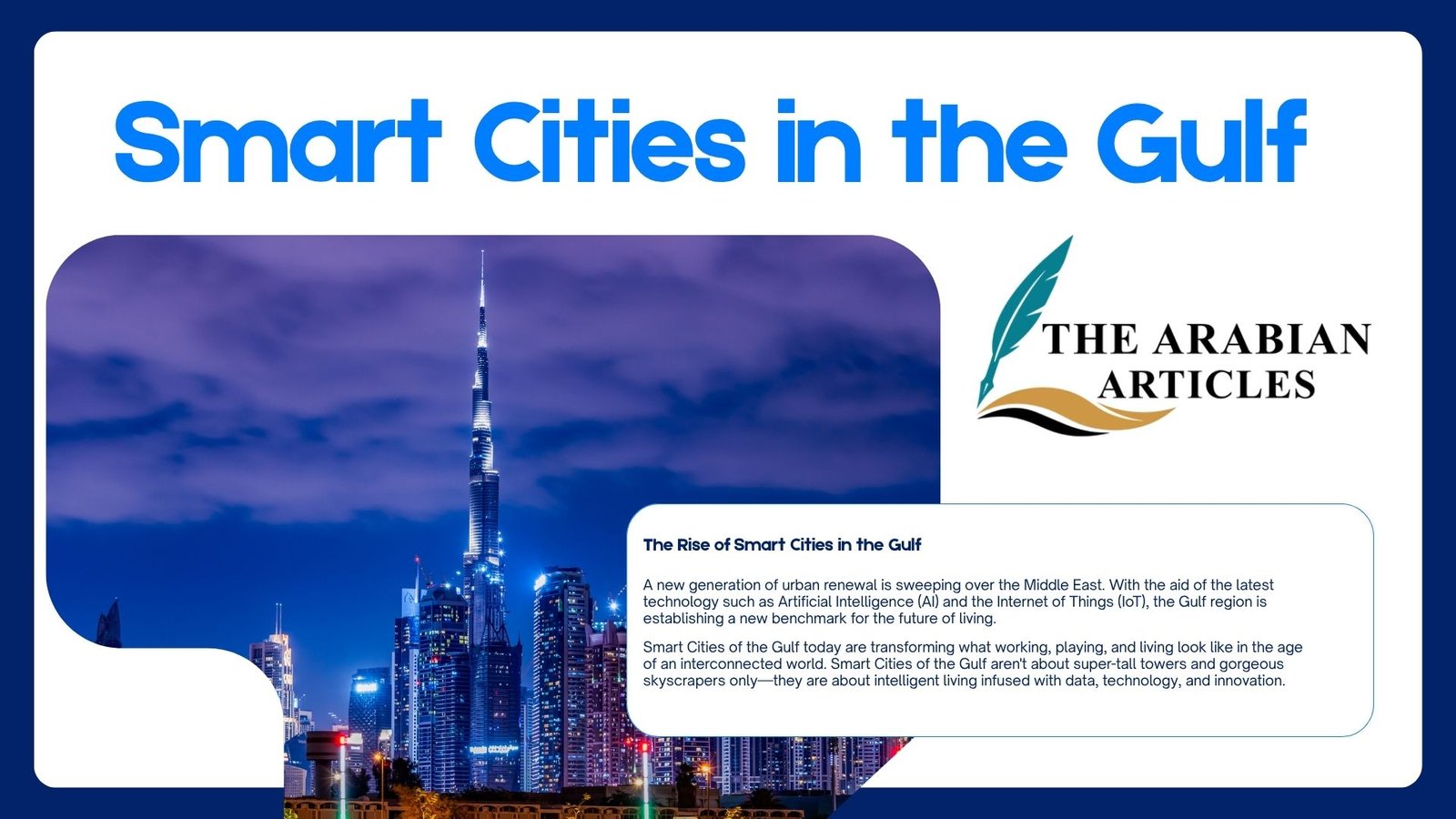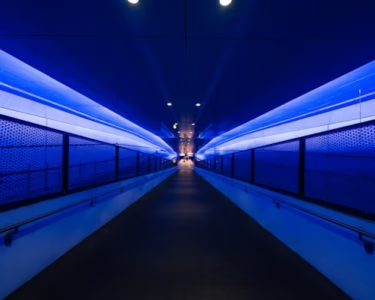The Rise of Smart Cities in the Gulf

A new generation of urban renewal is sweeping over the Middle East. With the aid of the latest technology such as Artificial Intelligence (AI) and the Internet of Things (IoT), the Gulf region is establishing a new benchmark for the future of living.
Smart Cities of the Gulf today are transforming what working, playing, and living look like in the age of an interconnected world. Smart Cities of the Gulf aren’t about super-tall towers and gorgeous skyscrapers only—they are about intelligent living infused with data, technology, and innovation.
Let’s explore how AI and IoT are transforming Gulf urban life, making cities more livable, efficient, and sustainable.
AI in Gulf Cities: Smarter Decisions for Better Living
Keyword Focus: AI in Gulf cities
In the Gulf, Artificial Intelligence is at the heart of urban development. Governments are heavily investing in AI-driven systems to enhance daily life and city management.
Key applications of AI in Gulf smart cities:
- Traffic Management: AI analyzes real-time traffic data to reduce congestion and suggest faster routes. Cities like Dubai and Riyadh use AI-based traffic control systems.
- Public Safety: AI-powered surveillance helps predict and prevent crimes, ensuring safer streets.
- Smart Healthcare: AI supports hospitals with faster diagnosis, virtual consultations, and efficient patient management.
- Energy Efficiency: AI monitors electricity usage and optimizes energy consumption in buildings.
Thanks to AI in Gulf cities, residents experience smoother transport, safer neighborhoods, and better public services every day.
IoT in Gulf Smart Cities: The Backbone of Connectivity
If AI is the brain, then IoT (Internet of Things) is the nervous system of a smart city. From smart traffic lights to connected homes, IoT in Gulf smart cities is creating a seamless, intelligent urban experience.
How IoT is making Gulf cities smarter:
- Smart Homes: IoT devices allow residents to control lighting, temperature, and security through their smartphones.
- Water Management: Smart sensors monitor water supply and detect leaks early, saving millions of liters annually.
- Waste Management: Smart bins notify authorities when they are full, optimizing waste collection routes.
- Environmental Monitoring: IoT devices track air quality and noise levels to promote healthier urban living.
In every corner, from homes to streets, IoT technology is connecting systems to make life easier and more efficient.
Dubai and NEOM: Leaders in Gulf Smart City Development
Two names stand out when we talk about Gulf smart city development—Dubai and NEOM.
Dubai: The Smart City Pioneer
Dubai is often called the first true smart city of the Gulf. Initiatives like Smart Dubai 2021 aim to make Dubai the happiest and smartest city on Earth.
- Blockchain for Government Services
- Smart Police Stations with AI services
- Self-driving taxis and AI-powered metro lines
Dubai’s focus on smart technology is an inspiration for other cities in the region.
NEOM: The City of the Future
NEOM, a $500 billion mega-project in Saudi Arabia, is designed to be the ultimate futuristic city.
- The Line: A 170 km linear smart city with no cars or streets
- Renewable Energy: 100% powered by solar and wind energy
- Advanced Healthcare: AI-driven medical services available 24/7
NEOM is a bold vision of how the future of Gulf cities might look by combining innovation, technology, and sustainability.
Sustainable Cities: A Key Goal of Urban Innovation in the Middle East
Keyword Focus: sustainable cities Gulf
With rising populations and environmental challenges, sustainability is a top priority for Gulf smart cities.
How Gulf cities are promoting sustainability:
- Green Buildings: New regulations require energy-efficient construction.
- Renewable Energy: Projects like Saudi Arabia’s Red Sea Project are fully powered by renewable sources.
- Public Transport: Expansion of electric buses, metro systems, and cycling paths.
The vision is clear: the Gulf doesn’t just want high-tech cities; it wants sustainable cities that can thrive for generations.
Challenges Facing Smart City Development in the Gulf
While the progress is impressive, there are still challenges to building smart cities in the Gulf:
- Cybersecurity Threats: As more devices connect to the internet, protecting data becomes crucial.
- High Costs: Building smart infrastructure requires heavy investment.
- Technology Adaptation: Encouraging citizens to embrace new technologies can take time.
Governments and private sectors are actively working together to address these issues and ensure the success of AI-driven cities.
The Future of Gulf Cities: Connected, Sustainable, and Smart
The vision of smart cities in the Gulf is no longer a distant dream—it’s here now. Led by AI and IoT, cities are becoming livable, green, and more responsive to their citizens’ needs.
From intelligent technology in Dubai to the vision of the future in NEOM, the Gulf is leading the world by example on how urban innovation in the Middle East is transforming modern life.
With increasing developments in technology and more people taking up digital ways of living, the smart cities of the Gulf will remain an inspiration, drive innovation, and lead the discussion worldwide regarding future urban life.
READ MORE-
Inside the Mind of a Startup Mentor: Advice for New Entrepreneurs in the GCC
The Future of Work in the Middle East – What Experts Predict for 2025 and Beyond







